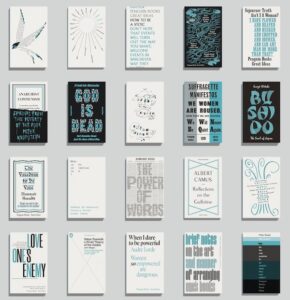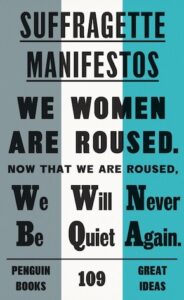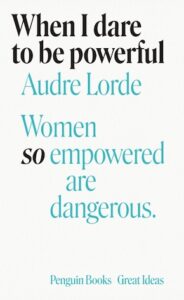The duty of disobedience
by Penguin Great IdeasTwenty-five years after its inception, ten years since the last instalment in the series, and with over 4 million copies sold to date, Penguin Great Ideas is back with a brand new selection of 20 titles. Bringing to readers the works of the many great thinkers, pioneers, radicals and visionaries whose ideas have shaken civilisation and helped shaped the world around us, the series takes some of their most important, perceptive and powerful works and presents these selections of writings in beautifully designed pocket-sized volumes.
From Audre Lorde’s searing words on female strength and solidarity to Epicurus’ reflections on the pursuit of happiness, from Peter Singer’s unflinching vegan philosophies to Sojourner Truth’s impassioned speeches on equal rights, and from Simone Weil’s exploration of the power of language employed by those in power to Martin Luther King’s sermons from the heart of the Civil Rights Movement, this is a timely collection of anarchists and stoics, feminists and prophets, satirists and Zen Buddhists whose work is as vital today as in their own time.
Award-winning designer David Pearson has returned to create many of the new covers, with art direction by Jim Stoddart, in the trademark typographic styles of the series.
Here are three indomitable female voices from the new releases, on a theme of dissent and action.
Freedom or death
by Emmeline Pankhurst
Delivered at Hartford, Connecticut, 13th November, 1913
Your forefathers decided that they must have representation for taxation, many, many years ago. When they felt they couldn’t wait any longer, when they laid all the arguments before an obstinate British government that they could think of, and when their arguments were absolutely disregarded, when every other means had failed, they began by the tea party at Boston, and they went on until they had won the independence of the United States of America.
It is about eight years since the word militant was first used to describe what we were doing. It was not militant at all, except that it provoked militancy on the part of those who were opposed to it.
We were called militant, and we were quite willing to accept the name. We were determined to press this question of the enfranchisement of women to the point where we were no longer to be ignored by the politicians.
You have two babies very hungry and wanting to be fed. One baby is a patient baby, and waits indefinitely until its mother is ready to feed it.
The other baby is an impatient baby and cries lustily, screams and kicks and makes everybody unpleasant until it is fed. Well, we know perfectly well which baby is attended to first. That is the whole history of politics.
You have to make more noise than anybody else, you have to make yourself more obtrusive than anybody else, you have to fill all the papers more than anybody else, in fact you have to be there all the time and see that they do not snow you under.
When your forefathers threw the tea into Boston Harbour, a good many women had to go without. It has always seemed to me an extraordinary thing that you did not follow it up by throwing the whiskey overboard.”
When you have warfare things happen; people suffer; the noncombatants suffer as well as the combatants. And so it happens in civil war. When your forefathers threw the tea into Boston Harbour, a good many women had to go without their tea. It has always seemed to me an extraordinary thing that you did not follow it up by throwing the whiskey overboard; you sacrificed the women; and there is a good deal of warfare for which men take a great deal of glorification which has involved more practical sacrifice on women than it has on any man. It always has been so. The grievances of those who have got power, the influence of those who have got power commands a great deal of attention; but the wrongs and the grievances of those people who have no power at all are apt to be absolutely ignored. That is the history of humanity right from the beginning.
Well, in our civil war people have suffered, but you cannot make omelettes without breaking eggs; you cannot have civil war without damage to something.
The great thing is to see that no more damage is done than is absolutely necessary, that you do just as much as will arouse enough feeling to bring about peace, to bring about an honourable peace for the combatants; and that is what we have been doing.
from Suffragette Manifestos
Emmeline Pankhurst was born in 1858 in Manchester into a politically active family, and became a supporter of women’s suffrage by the age of fourteen. She was a member of the Women’s Franchise League and later the Independent Labour Party. In 1903, frustrated by the lack of progress on securing votes for women, Pankhurst and several colleagues founded the Women’s Social and Political Union (WSPU), a militant organisation devoted to securing votes for women by direct action. For the following twenty years, members of the WSPU, led by Pankhurst, endured prison and hunger strikes in their struggle to win the right to vote. Their activities were called to a halt by the start of the First World War but in 1918, the government gave voting rights to women over thirty. Emmeline died on 14 June 1928, shortly after women were granted equal voting rights with men.
The freedom to be free: The conditions and meaning of revolution
by Hannah Arendt
‘A Lecture’, 1966–67
My subject today, I’m afraid, is almost embarrassingly topical. Revolutions have become everyday occurrences since, with the liquidation of imperialism, so many peoples have risen ‘to assume among the powers of the earth the separate and equal station to which the laws of nature and nature’s God entitle them’. Just as the most lasting result of imperialist expansion was the export of the idea of the nation-state to the four corners of the earth, so the end of imperialism under the pressure of nationalism has led to the dissemination of the idea of revolution all over the globe.
All these revolutions, no matter how violently anti-Western their rhetoric may be, stand under the sign of traditional Western revolutions. The current state of affairs was preceded by the series of revolutions after the First World War in Europe itself. Since then, and more markedly after the Second World War, nothing seems more certain than that a revolutionary change of the form of government, in distinction to an alteration of administration, will follow defeat in a war between the remaining powers – short, that is, of total annihilation. But it is important to note that even before technological developments made wars between the great powers literally a life-and-death struggle, hence self-defeating, politically speaking wars had already become a matter of life and death. This was by no means a matter of course, but signifies that the protagonists of national wars had begun to act as though they were involved in civil wars. And the small wars of the last twenty years – Korea, Algeria, Vietnam – have clearly been civil wars, in which the great powers became involved, either because revolution threatened their rule or had created a dangerous power vacuum. In these instances it was no longer war that precipitated revolution; the initiative shifted from war to revolution, which in some cases, but by no means all, was followed by military intervention. It is as if we were suddenly back in the eighteenth century, when the American Revolution was followed by a war against England, and the French Revolution by a war against the allied royal powers of Europe.
And again, despite the enormously different circumstances – technological and otherwise – military interventions appear relatively helpless in the face of the phenomenon. A large number of revolutions during the last two hundred years went to their doom, but relatively few were dissipated by superiority in the application of the means of violence. Conversely, military interventions, even when they were successful, have often proved remarkably inefficient in restoring stability and filling the power vacuum. Even victory seems unable to substitute stability for chaos, honesty for corruption, authority and trust in government for decay and disintegration.
In the world’s present configuration, for better or worse, revolutions have become the most significant and frequent events – and this will most likely continue for decades to come.”
Restoration, the consequence of an interrupted revolution, usually provides not much more than a thin and quite obviously provisional cover under which the processes of disintegration continue unchecked. But there is, on the other hand, a great potential future stability inherent in consciously formed new political bodies, of which the American Republic is the prime example; the principal problem, of course, is the rarity of successful revolutions. Still, in the world’s present configuration where, for better or worse, revolutions have become the most significant and frequent events – and this will most likely continue for decades to come – it would not only be wiser but also more relevant if, instead of boasting that we are the mightiest power on earth, we would say that we have enjoyed an extraordinary stability since the founding of our republic, and that this stability was the direct outgrowth of revolution. For, since it can no longer be decided by war, the contestation of the great powers may well be decided, in the long run, by which side better understands what revolutions are and what is at stake in them.
from The Freedom To Be Free
Hannah Arendt was born in Hanover in 1906, and received her doctorate in philosophy from the University of Heidelberg. In 1933, she was briefly imprisoned by the Gestapo, after which she fled Germany for Paris, where she worked on behalf of Jewish refugee children. In 1937, she was stripped of her German citizenship, and in 1941 she left France for the United States. Her many books include The Origins of Totalitarianism (1951), The Human Condition (1958) and Eichmann in Jerusalem (1963), in which she coined the famous phrase ‘the banality of evil’. She died in 1975.
The transformation of silence into language and action
by Audre Lorde
Paper delivered at the Modern Language Association’s ‘Lesbian and Literature Panel’, Chicago, December 28, 1977
I have come to believe over and over again that what is most important to me must be spoken, made verbal and shared, even at the risk of having it bruised or misunderstood. That the speaking profits me, beyond any other effect. I am standing here as a Black lesbian poet, and the meaning of all that waits upon the fact that I am still alive, and might not have been. Less than two months ago I was told by two doctors, one female and one male, that I would have to have breast surgery, and that there was a 60 to 80 percent chance that the tumor was malignant. Between that telling and the actual surgery, there was a three-week period of the agony of an involuntary reorganization of my entire life. The surgery was completed, and the growth was benign.
But within those three weeks, I was forced to look upon myself and my living with a harsh and urgent clarity that has left me still shaken but much stronger. This is a situation faced by many women, by some of you here today. Some of what I experienced during that time has helped elucidate for me much of what I feel concerning the transformation of silence into language and action.
In becoming forcibly and essentially aware of my mortality, and of what I wished and wanted for my life, however short it might be, priorities and omissions became strongly etched in a merciless light, and what I most regretted were my silences. Of what had I ever been afraid? To question or to speak as I believed could have meant pain, or death. But we all hurt in so many different ways, all the time, and pain will either change or end. Death, on the other hand, is the final silence. And that might be coming quickly, now, without regard for whether I had ever spoken what needed to be said, or had only betrayed myself into small silences, while I planned someday to speak, or waited for someone else’s words. And I began to recognize a source of power within myself that comes from the knowledge that while it is most desirable not to be afraid, learning to put fear into a perspective gave me great strength.
I was going to die, if not sooner then later, whether or not I had ever spoken myself. My silences had not protected me. Your silence will not protect you. But for every real word spoken, for every attempt I had ever made to speak those truths for which I am still seeking, I had made contact with other women while we examined the words to fit a world in which we all believed, bridging our differences. And it was the concern and caring of all those women which gave me strength and enabled me to scrutinize the essentials of my living.
For us all, it is necessary to teach by living and speaking those truths which we believe and know beyond understanding… in this way alone we can survive.”
For those of us who write, it is necessary to scrutinize not only the truth of what we speak, but the truth of that language by which we speak it. For others, it is to share and spread also those words that are meaningful to us. But primarily for us all, it is necessary to teach by living and speaking those truths which we believe and know beyond understanding. Because in this way alone we can survive, by taking part in a process of life that is creative and continuing, that is growth.
from When I Dare To Be Powerful
Audre Lorde was an American writer, feminist and civil rights activist – or, as she famously put it, ‘Black, lesbian, mother, warrior, poet’. Born in New York in 1934, she had her first poem published while she was still in high school. After stints as a factory worker, ghostwriter, social worker, X-ray technician, medical clerk and arts and crafts supervisor, she became a librarian in Manhattan and gradually rose to prominence as a poet, essayist and speaker, anthologised by Langston Hughes, lauded by Adrienne Rich, and befriended by James Baldwin. She was made Poet Laureate of New York State in 1991, when she was awarded the Walt Whitman prize; she was also awarded honorary doctorates from Hunter, Oberlin and Haverford colleges. She died of cancer in 1992, aged 58.
The 20 new titles in the Penguin Great Ideas series are out now in paperback and eBook.
Read more
@classicpenguins
@PenguinUKBooks
#PenguinGreatIdeas





